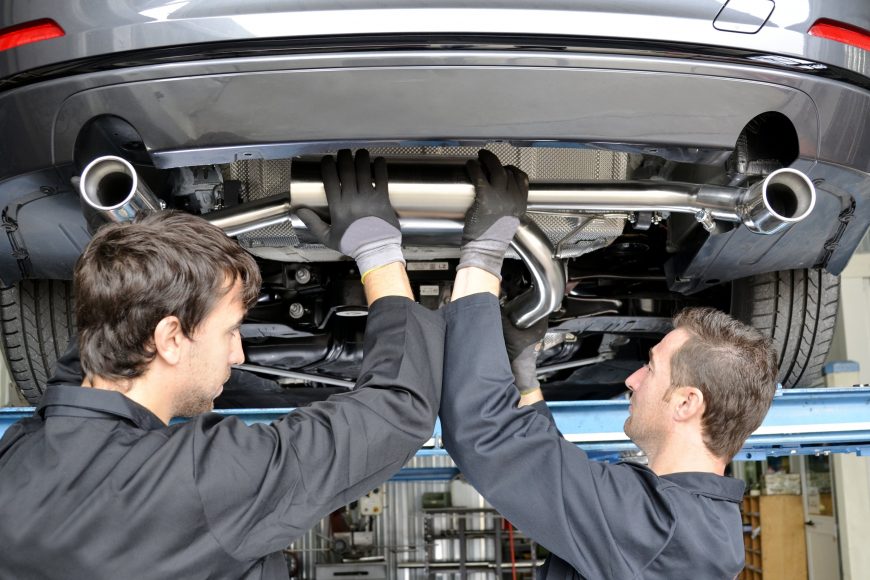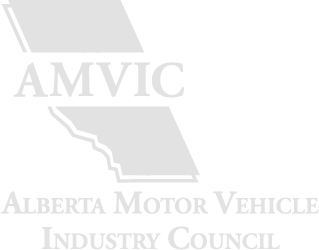- December 15, 2019
- By Park Muffler
- In Blog, Mufflers
What Does My Muffler Do?

If you’re driving in Edmonton and notice your vehicle’s suddenly louder, your muffler could be the reason. A muffler’s main job is to control engine noise. When they break down, you’ll notice your vehicle get very loud and neighbours become very unhappy!
However, apart from satisfying noise pollution laws, today’s mufflers are also designed to increase your vehicle’s performance and protect you and the passengers in your car. Read on to learn more about how mufflers work and what they do for your vehicle.
How Does A Muffler Work?
The inside of a muffler is built with a set of perforated tubes. These tubes are designed to reflect sound waves produced by the engine which minimizes the amount of noise that leaves your vehicle. The tubes also act as a way to remove exhaust gases from the engine, which in turn helps to increase the vehicle’s performance and direct the gases away from the interior of the vehicle.
This exhaust, along with the sound waves, enters the muffler through a center tube. They are then bounced off the back wall of the muffler and pushed into the main body of the muffler.
Once in the muffler’s main body, they pass through a series of holes that take them through the last chamber and out the exit pipe.
Noise Control
As your engine runs, it generates thousands of little sound bursts as highly pressurized gas is released. These sounds travel down your exhaust pipe – so you can imagine how loud they would be if there was no component to muffle the sound.
But mufflers do more than simply muffle sound. The coolest thing about your muffler is that it’s meant to “tune” your engine’s sound output. This means that different types of mufflers will give you different sounds. You can make your vehicle as quiet as possible or you can give it a deep growling sound. No matter your wants or needs, there is a performance muffler out there for you!
Performance Enhancement
As mentioned above, mufflers do more than tune and muffle sounds. They are also used to increase the performance of your vehicle. How do they do this?
The faster your engine can get rid of exhaust gases, the faster it can take in oxygen and generate more power. By that standard, you may be thinking that no muffler is the way to go – why not cut out the middleman when it comes to releasing exhaust and intaking air? Unfortunately, that may land you a hefty noise violation ticket from your local police, since noise levels are strictly monitored.
Luckily, mufflers are designed to perform this function in the best interest of your vehicle’s performance. Muffler experts have created many efficient designs that minimize exhaust exit time while still keeping in line with noise regulations.
Fume Protection
Your vehicle’s exhaust system is designed to draw fumes from the front of the car to the back. The muffler filters these fumes into the atmosphere.
If there is a crack or hole in the muffler, the fumes can make their way to the interior of the vehicle. Exhaust fumes contain carbon monoxide and other highly hazardous chemicals and toxins. Over time, this can cause serious harm to you and your passengers.
What Causes Mufflers to Break?
Like any component of your vehicle, mufflers can deteriorate over time – both internally and externally. How quickly this happens depends entirely on the age and use of the vehicle as well as where you live.
The most common reason for mufflers to break or develop holes is external rust. Rust forms on the outside of the muffler and eats through its structure. This can be caused by exposure to substances such as salt, which is often used on roads in the winter time.
Rust can also form inside of the muffler due to condensation. If you’ve ever seen water droplets fall from your exhaust pipe when you first start your car, this is completely normal. They are a byproduct of the condensation that occurs when the exhaust pipe is hot and then cools down. However, that condensation and water never completely drains out of your muffler and can lead to internal rust.
If you notice a steady stream of water coming out of the water, not just droplets, this can mean that there is excessive rust or rot within the muffler.
Muffler Repair Versus Replacement
When you do run into issues with your muffler, whether there is a hole in the muffler or other problems happening in the exhaust system, it’s important to have the issue fixed right away. Otherwise, you are looking at either the aforementioned noise violation fine or decreased efficiency of your vehicle’s fuel system.
Whatever the situation, there is always a potential to repair the broken muffler but there may be situations in which a replacement is necessary. Our expert technicians at Park Muffler are happy to guide you to making the best decisions for your vehicle’s muffler and exhaust system.
Many car repair shops will advise you to completely replace the entire muffler when it needs repaired. Our team specializes in mufflers and we have the knowledge and experience to perform a variety of muffler repairs, from simple to complex!
Through custom pipe bending, welding, and other techniques we can repair mufflers – and repairs cost far less than replacements.
Looking for a New Muffler?
If you’re searching for a new performance muffler to add to your vehicle, talk to the experts at Park Muffler. Our team will find you the perfect muffler for your vehicle performance and sound needs.
Proudly Canadian owned and operated
© Park Muffler - All Rights Reserved.

